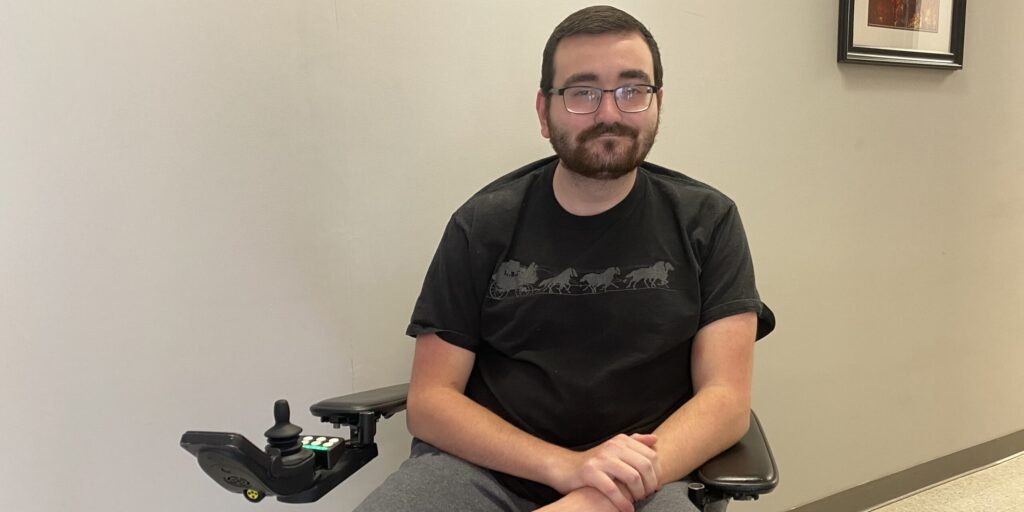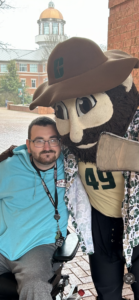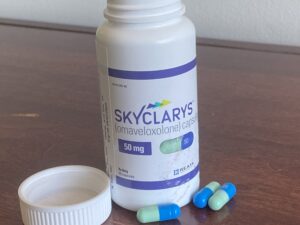
MDA Ambassador Guest Blog: Finding Hope and Optimism in New Treatments
By Chase Rankin | Tuesday, June 4, 2024
5 Second Summary
MDA Ambassadors play an essential role in furthering MDA’s mission while representing and empowering the neuromuscular disease community. Quest Ambassador Guest Blog series provides a platform to share their personal stories, perspectives, and experience.
Chase Rankin was diagnosed with Friedreich’s ataxia in 7th grade. He is now majoring in Communication Studies at the University of North Carolina at Charlotte.

Chase Rankin
I’ll be completely honest: I used to not be very optimistic when it came to clinical trials. I would hear news of an ongoing clinical trial for a promising new drug, and I would just shrug it off with a, “I’ll believe it when I see it.” It always seemed just a little too promising, and it felt like nothing ever came from it. I did not doubt that there would be a treatment for muscular dystrophy one day, but I had figured that it would be a long, long wait. You don’t need to be a scientist to understand that muscular dystrophy — or any neuromuscular disease in general — is very complicated. And the more complicated the issue, the more complex the solution.
I have Friedreich’s ataxia (FA), an exceptionally rare form of Muscular Dystrophy. I figured the odds of a rare variation of an already relatively rare neuromuscular disease getting its own treatment was out of the question. There had been a few studies on FA in the past, but as far as I’m aware, these were studies of the disease itself rather than research on potential treatment options. However, I had heard a few mentions here and there of a drug — Skyclarys — undergoing testing. It was showing great promise, and it was slowly creeping toward FDA approval. As I said, optimism isn’t something that I’m known for, but I would be lying if I said that this wasn’t exciting news that had me interested in seeing where this went.
Things grew quiet for a while, and that little glimmer of hopeful optimism started to fade. I was getting busier with college, and eventually, I had forgotten about Skyclarys. One night before bed, I was scrolling through Instagram and saw a post by an influencer that I follow, someone who also has Friedreich’s ataxia. They were celebrating the fact that Skyclarys had been approved by the FDA and was scheduled to be distributed soon. I was in total disbelief. I sat there, shocked and overjoyed, for several minutes before telling my parents the news. The next step was letting my doctor know that I wanted to start Skyclarys, and then it was a matter of blood tests and paperwork — lots of paperwork.

Chase Rankin’s prescribed medication, Skyclarys
I’ve been taking Skyclarys for a few months now. I was a little nervous at first, as anyone would be when taking a new medication, but I’ve been going strong with it with no crazy side effects. I get regular blood tests every month to ensure that everything is staying normal and that my dosage does not require any alterations, and so far, so good.
I’m not a pharmacist, so I won’t be able to get into what the medicine does on a deep chemical level, but the purpose of the medication is to slow the progression of Friedreich’s ataxia. I have also heard from those who use Skyclarys that their voice has gotten stronger (slurred speech is a common symptom amongst those with FA). My parents and friends have said that my voice sounds stronger – I wasn’t sure about that at first, but a few weeks later, I picked up on this, too.
As I’ve said, I used to not have the highest hopes for clinical trials, but holding a bottle of Skyclarys in my hand—holding on to actual proof that there is always hope—has changed everything for me. Of course, I still have days where my pessimism gets the better of me (I think that pessimism is baked into my DNA), but when I think of Skyclarys, I’m reminded that we should always keep trying and never give up hope.
Next Steps and Useful Resources
- For more information about the signs and symptoms of Friedrich Ataxia, as well an overview of diagnosis and treatment concerns, an in-depth review can be found here.
- To learn more about MDA’s Mental Health Hub, visit here.
- MDA’s Resource Center provides support, guidance, and resources for patients and families. Contact the MDA Resource Center at 1-833-ASK-MDA1 or ResourceCenter@mdausa.org
- Download Clinical Trials 101 to understand clinical trial types, phases, and more.
- Watch an MDA Community Education webinar on clinical trial research and participation.
- Use MDA’s Clinical Trial Finder to search for studies by condition and other criteria.
- Stay up-to-date on Quest content! Subscribe to Quest Magazine and Newsletter.
Disclaimer: No content on this site should ever be used as a substitute for direct medical advice from your doctor or other qualified clinician.




